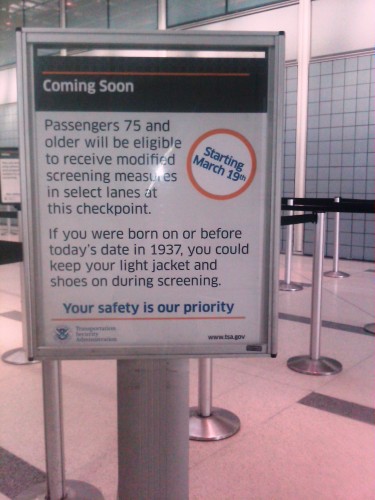Turns out age has its advantages.
Recent stories of a 95-year-old flier in Florida who claimed a TSA agent asked her to remove her adult diaper and an elderly flier who claimed she was strip- searched at JFK airport brought attention to the difficulties many elderly travelers encounter at security checkpoints.
Now the TSA will begin testing new procedures that “enhance security and may improve the travel experience for passengers in this age group.”
Beginning Monday, March 19, modified airport screening procedures for passengers 75 and older will begin at four U.S. airports: Chicago O’Hare (ORD), Denver International Airport (DEN), Orlando International Airport (MCO) and Portland International Airport (PDX). According to TSA spokesperson Lisa Farbstein, the percentage of passengers in the 75 and older group is slighter higher at these airports.
The modified procedures being tested will be similar to those recently implemented for children age 12 and under who no longer need to remove their shoes and light outerwear at airport checkpoints and are allowed a ‘do-over’ through the advanced imaging technology to clear any anomalies. However, as with the procedures for young children, the TSA reserves the right to ask those over 75 to remove their shoes and undergo a pat-down if any anomalies detected during security screening cannot be resolved through other procedures.
Farbstein said there is no defined end to the pilot program, but noted that in August 2011, TSA began a pilot program of expedited screening procedures for travelers 12 and under and went national with that program a month later. “But I don’t want to be raising expectations too soon for this program,” said Farbstein. “Each airport testing the 75 and older program is doing so at only one checkpoint.”
Here’s where to get the expedited service:
- Chicago O’Hare International Airport (ORD): Security Checkpoint 3, Terminal 1
- Denver International Airport (DEN): South Checkpoint/USA Flag Checkpoint
- Orlando International Airport (MCO): West Checkpoint
- Portland International Airport (PDX): ABC Checkpoint, lane 7 and 8.
At the participating airport checkpoints, travelers will see a sign alerting them to the program. “We think people 75 and older will announce themselves,” said Farbstein. She added that officers will also do visual assessments and direct those who qualify to a special lane for expedited screening.
“We think this will improve security,” said Farbstein. “We know it’s not one-size-fits-all and this will allow us to focus more of our time on passengers we know less about.”
The TSA has implemented several other risk-based initiatives in the past year that have also reduced and/or changed the screening requirements for many passengers. Those programs include the Known Crew Member program, the use of expanded behavior detection techniques and the TSA Pre-Check expedited screening initiative.
The agency also introduced TSA CARES, a toll-free number (1-855-787-2227) to assist travelers with disabilities and medical conditions and answer questions about screening policies, procedures and what to expect at the airport security checkpoint.
The helpline hours are Monday through Friday 9 a.m. – 9 p.m. EST (excluding federal holidays) and accommodations are available for travelers who are deaf or hard of hearing. The TSA recommends that passengers call approximately 72 hours ahead of travel so that, if necessary, checkpoint support for a customer can be arranged with a TSA Customer Service Manager at an airport.
